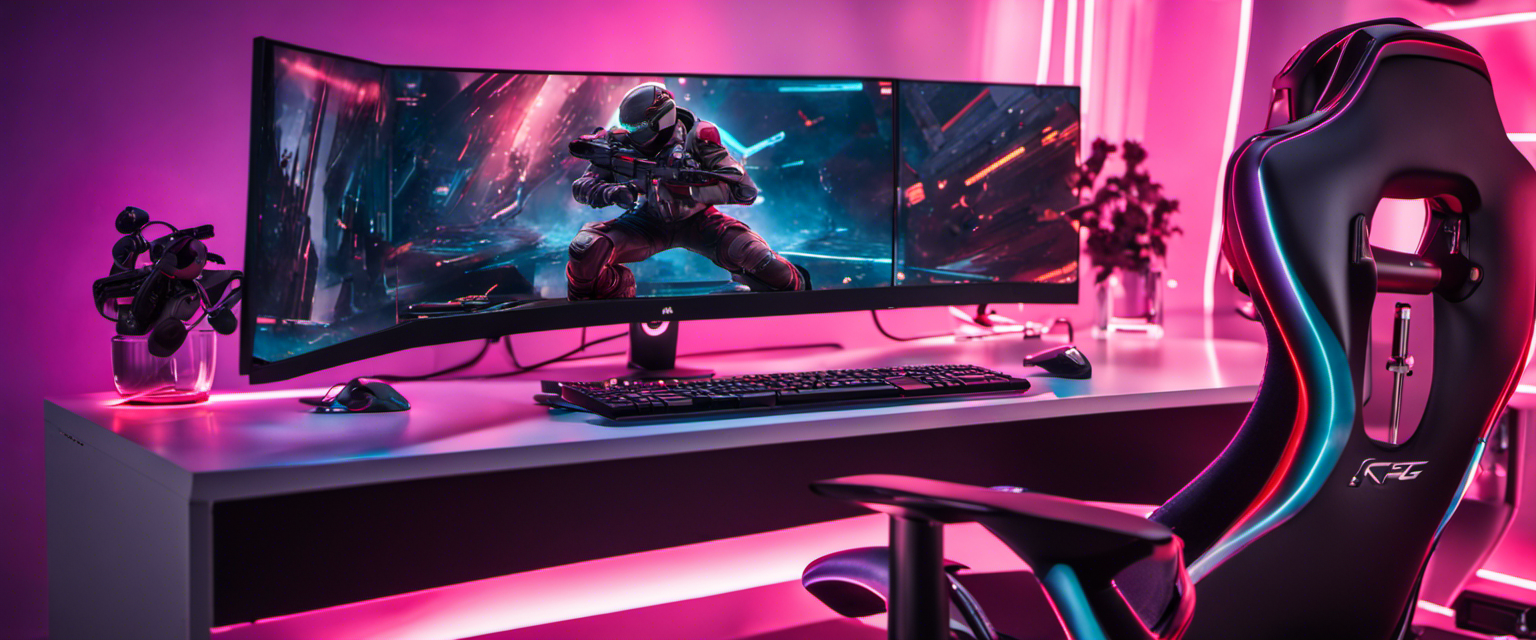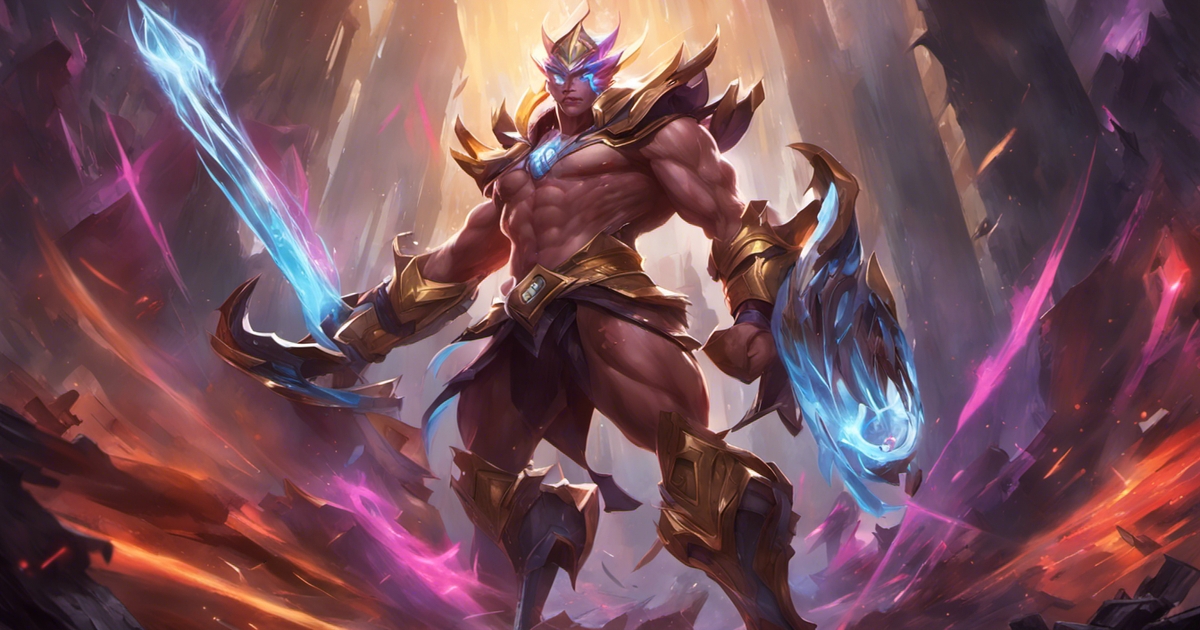What is Gaming: Everything To Know About Gaming

- What is Gaming?
- Advantages and Disadvantages of Playing Video Games
- Gaming Terminology & Slang
- Gaming Platforms: Console vs PC vs Mobile Gaming
- Popular Video Game Genres
- Gaming As A Career
- Gaming & Esports
- Gaming Equipment: Hardware & Accessories
- Dedication and Skills Required for Great Gamers
- Conclusion: Understanding Gaming
Welcome to the ultimate guide to understanding gaming.
Whether you’re new to the world of gaming or a seasoned player, this article will provide you with a comprehensive overview of what gaming is all about. From the different types of game genres and consoles to the benefits of gaming, we’ll cover it all.
So, grab your controller or keyboard, and let’s jump into the exciting and diverse world of gaming.
What is Gaming?
Gaming refers to the act of playing video games.
It involves immersing oneself in a virtual world through various devices, such as consoles, computers, or mobile phones. Whether it’s battling mythical creatures, solving puzzles, or competing against friends online, gaming offers endless opportunities for entertainment, competition, and social interaction.
Advantages and Disadvantages of Playing Video Games
Playing video games can be super fun and all, but there are also some good and bad things about it. Let’s go over some benefits of gaming and negative effects of gaming.
Benefits of Gaming
1. Improve cognitive skills
Gaming offers a wide range of benefits that can positively impact our cognitive abilities. When we engage in video games, our brains are constantly challenged to think strategically, solve problems, and make quick decisions. This process stimulates various areas of the brain responsible for memory, attention, and logical reasoning. In fact, studies have shown that gaming can enhance cognitive skills such as spatial awareness and multitasking.
2. Develop problem-solving abilities
Furthermore, gaming requires us to develop problem-solving abilities. Many games present us with complex puzzles or obstacles that we must overcome using critical thinking and creativity. These challenges encourage us to think outside the box and develop innovative solutions. By consistently engaging in these problem-solving scenarios, we can sharpen our analytical skills and improve our ability to approach real-life challenges with a strategic mindset.
3. Enhance hand-eye coordination.
Another advantage of gaming is its positive impact on hand-eye coordination. Playing video games often involves precise movements and quick reflexes. Whether it’s aiming at targets or maneuvering through virtual environments, gamers must develop the ability to coordinate their visual perception with their physical actions. This not only enhances hand-eye coordination but also improves motor skills.
Cons of Excessive Gaming
1. Risk of addiction
While there are numerous benefits associated with gaming, it is important to acknowledge the potential drawbacks as well. One significant concern is the risk of addiction. Just like any other activity that provides enjoyment or escapism, excessive gaming can lead to addictive behaviors. Spending excessive amounts of time playing video games may negatively affect other aspects of life such as academics, work performance, and relationships.
2. May lead to a sedentary lifestyle
Prolonged periods of sitting while gaming contribute to a sedentary lifestyle which can have detrimental effects on overall health. Lack of physical activity among gamers increases the risk of obesity, cardiovascular diseases, and musculoskeletal issues. It is crucial for gamers to incorporate regular exercise and movement into their daily routines to counterbalance the sedentary nature of gaming.
3. Increased possibility of social isolation
Another potential drawback is the possibility of social isolation. Spending excessive time immersed in virtual worlds can lead to a decrease in face-to-face interactions with friends, family, and peers. While online multiplayer games provide opportunities for social interaction, it is important to strike a balance between virtual and real-life connections. Maintaining a healthy social life outside of gaming is essential for personal growth, emotional well-being, and building meaningful relationships.

Moderation is key to enjoying the benefits while minimizing the drawbacks.
To fully enjoy the benefits that gaming has to offer while minimizing its potential drawbacks, moderation is crucial. It’s all about finding the right balance between gaming and other aspects of life. Responsible gaming involves setting limits on playing time and ensuring that it does not interfere with daily responsibilities or relationships.
By establishing a schedule that includes designated times for gaming as well as other activities such as schoolwork, physical exercise, hobbies, and socializing, gamers can maintain a healthy equilibrium. This approach allows individuals to reap the cognitive benefits of gaming while mitigating the risks associated with excessive playtime.
Gaming Terminology & Slang
Understanding the world of gaming can sometimes feel like learning a whole new language. Gamers have their own set of terms, slang, and abbreviations that they use during gameplay and discussions.
10 Common Gaming Terms
- AFK: Away From Keyboard, refers to a player being temporarily inactive or not present in the game.
- DPS: Damage Per Second, measures the amount of damage a player or character can deal in a certain amount of time.
- GG: Good Game, used to express sportsmanship or to acknowledge a well-played game.
- Noob: A derogatory term for a new or inexperienced player.
- PVP: Player versus Player, refers to gameplay where players compete against each other.
- RNG: Random Number Generator, refers to the element of chance or randomness in a game.
- FPS: Frames Per Second, measures the number of frames displayed per second in a game.
- OP: Overpowered, describes something that is excessively strong or unfair in terms of gameplay.
- GGWP: Good Game, Well Played, used to express sportsmanship and respect after a match.
- Farming: The act of repeatedly killing enemies or completing certain tasks to gain experience, resources, or items in a game.
Understanding gaming terminology helps navigate discussions about games.
Whether you’re participating in online forums, watching gaming streams, or discussing games with friends, having a good grasp of gaming terminology can greatly enhance your experience. It allows you to effectively communicate your thoughts, understand others’ opinions, and contribute meaningfully to conversations about games.
Gaming Platforms: Console vs PC vs Mobile Gaming
Gaming has become a popular form of entertainment, and there are various gaming platforms available for gamers to choose from. Let’s take a closer look at the three main gaming platforms: consoles, PCs, and mobile gaming.
Consoles Offer Optimized Hardware for Gaming Experiences

Consoles, such as PlayStation and Xbox, provide dedicated hardware that is specifically optimized for gaming. These devices offer powerful processors and graphics cards designed to deliver immersive gameplay experiences.
Pros:
- Dedicated hardware ensures smooth performance and minimal lag.
- Exclusive game titles often released only for consoles.
- User-friendly interfaces make it easy to navigate and play games.
Cons:
- Limited customization options compared to PCs.
- Higher upfront cost for the console itself.
- Online multiplayer may require additional subscription fees.
PCs Provide Flexibility and Access to a Wide Range of Games

PC gaming offers unparalleled flexibility in terms of customization options. Gamers can upgrade their hardware components to enhance performance or adapt to new game requirements. PCs have access to a vast library of games through online platforms like Steam.
Pros:
- Customizable hardware allows players to optimize their gaming experience.
- A wide range of games available, including indie titles and classics.
- Mods and user-generated content add depth and variety to games.
Cons:
- Higher cost compared to consoles, especially for high-end components.
- Technical knowledge required for building or upgrading a gaming PC.
- Some games may be exclusive to certain consoles or not optimized well for PC.
Mobile Gaming: Enjoy Games Anytime, Anywhere

Mobile gaming has gained immense popularity due to its convenience and accessibility. With smartphones becoming more powerful, players can enjoy high-quality games on the go. App stores offer a plethora of mobile game options across various genres.
Pros:
- Portability allows gamers to play anytime, anywhere.
- Wide range of free-to-play games with optional in-app purchases.
- Touchscreen controls and gyroscopic sensors offer unique gameplay experiences.
Cons:
- Limited processing power compared to consoles and PCs.
- Smaller screens may not provide the same immersive experience as larger displays.
- Battery life can be a concern during extended gaming sessions.
Popular Video Game Genres
Video game genres refer to categories or classifications that are used to group similar types of video games together based on their gameplay mechanics, themes, and overall experience.
These genres serve as a way for players to quickly identify and choose games that align with their preferences and interests. Each genre typically has its own set of defining characteristics and gameplay features that distinguish it from other genres.
So, let’s dive in and discover the most popular game genres that have captivated millions of players around the world.
- Action-adventure gamesAction-adventure games combine elements of action and exploration in immersive storylines. Players get to engage in thrilling combat sequences while also navigating through vast virtual worlds. Titles like “Assassin’s Creed” and “The Legend of Zelda” fall into this category, offering players a mix of adrenaline-pumping action and captivating narratives.
- Role-playing games (RPGs)In RPGs, players assume the roles of fictional characters within expansive virtual worlds. They embark on quests, level up their characters, and make choices that impact the game’s storyline. Games like “The Elder Scrolls V: Skyrim” and “Final Fantasy VII” exemplify the depth and complexity that RPGs offer.
- Sports gamesWhether it’s football, basketball, or soccer, sports games simulate real-life sports activities with stunning realism. Fans can compete against AI or other players in multiplayer modes to showcase their skills on the digital field or court. Popular sports game franchises include FIFA, NBA 2K, and Madden NFL.
- Shooter gamesShooter games put players in intense combat scenarios where they must use various weapons to eliminate enemies or accomplish objectives. From first-person shooters like “Call of Duty” to third-person shooters like “Gears of War,” shooter games offer fast-paced action and strategic gameplay.
- Simulation gamesSimulation games allow players to step into different roles or scenarios, replicating real-world experiences. Whether it’s managing a city in SimCity or piloting an aircraft in Microsoft Flight Simulator, simulation games provide a realistic simulation of various activities.

- Casual gamesCasual games cater to a broader audience by offering simple gameplay mechanics that are easy to pick up and play. These games often feature puzzles, match-three mechanics, or arcade-style challenges that can be enjoyed in short bursts. Mobile games like “Candy Crush” and “Angry Birds” are prime examples of casual games that have become global sensations.
- Strategy gamesStrategy games require players to think critically and plan their moves strategically. Whether it’s building an empire in civilization-building games or commanding armies in real-time strategy (RTS) titles, strategy games test players’ decision-making skills and tactical prowess. Popular strategy game franchises include “Civilization,” “StarCraft,” and “Total War.
Gaming As A Career
Gaming has evolved from a casual pastime to a full-fledged career option. With the rise of the gaming industry, there are now various opportunities for individuals to turn their passion for gaming into a viable profession. Let’s explore some of the different avenues available in the world of gaming careers.

Professional Gamers Can Earn A Living
Believe it or not, playing video games can actually be a lucrative profession. Professional gamers have the opportunity to participate in tournaments and compete against other skilled players. These competitions offer substantial prize money, sponsorships, and even contracts with esports organizations. By honing their skills and dedicating countless hours to perfecting their gameplay, professional gamers can earn a living doing what they love.
Careers in Game Development
If creating games is more appealing than playing them, pursuing a career in game development might be the right path. Game development involves designing, programming, and testing video games. It requires a combination of technical skills and creativity to bring virtual worlds to life. Whether it’s conceptualizing captivating storylines or coding intricate gameplay mechanics, game developers play an integral role in shaping the gaming experience for millions of players worldwide.
Opportunities in Game Journalism and Content Creation
For those who possess excellent communication skills and a deep knowledge of the gaming industry, careers in game journalism and content creation provide exciting possibilities. Game journalists report on industry news, review new releases, and interview key figures within the gaming community. Content creators produce engaging videos or livestreams that showcase gameplay experiences or provide informative tutorials for fellow gamers. These roles allow individuals to share their passion for gaming while building an audience online.
Breaking Stereotypes: Female Gamers Making Their Mark
Gaming is often seen as a male-dominated field; however, female gamers are breaking stereotypes and making significant contributions within the industry. Women are excelling as professional gamers, game developers, streamers, journalists, and content creators. Their achievements not only inspire other female gamers but also play a crucial role in diversifying the gaming landscape. The rise of prominent female streamers and esports players has demonstrated that gaming is for everyone, regardless of gender.
Gaming & Esports
Esports, which stands for electronic sports, refers to competitive gaming at a professional level with organized tournaments. Major esports events attract millions of viewers worldwide, making it a global phenomenon.
Esports teams compete in popular games like League of Legends, Counter-Strike: Global Offensive (CS:GO), and Dota 2. These games have become the battlegrounds for skilled players who aim to showcase their abilities and compete for glory. The intensity and skill required in these games are on par with traditional sports.

The esports industry has experienced exponential growth over the years. It has evolved into a full-fledged ecosystem with dedicated leagues, sponsorships, and substantial financial investments. This growth has created opportunities not only for professional gamers but also for various other roles within the industry such as coaches, analysts, commentators, and event organizers.
Gaming Equipment: Hardware & Accessories
Gaming equipment like hardware and accessories are essential components for an optimal gaming experience. They enhance gameplay, provide immersive audio, and deliver stunning visuals. Let’s explore some of the key elements in gaming hardware and accessories.

Consoles, PCs, Monitors
Consoles and PCs are the primary choices for gamers. Consoles like PlayStation and Xbox offer a dedicated gaming experience with exclusive titles. On the other hand, PCs provide flexibility in terms of customization and performance upgrades. When setting up your gaming rig at home, consider factors such as budget, game compatibility, and personal preferences.
Monitors play a significant role in delivering crisp visuals during gameplay. High refresh rates (measured in Hertz) ensure smooth motion, while low response times reduce input lag. Look out for features like Adaptive-Sync technology (such as AMD FreeSync or NVIDIA G-SYNC) that eliminate screen tearing for a seamless visual experience.
Controllers, Keyboards & Mice
Controllers are an integral part of console gaming, allowing players to navigate through games effortlessly. They come in various designs with different button layouts to suit individual preferences.
For PC gamers, keyboards and mice are crucial peripherals that offer precise control over gameplay. Mechanical keyboards provide tactile feedback and faster response times compared to traditional membrane keyboards. Gaming mice often come with customizable buttons and adjustable DPI settings for enhanced accuracy.
Headsets
To truly immerse yourself in the world of gaming, a good headset is essential. Gaming headsets not only deliver high-quality audio but also provide crucial communication capabilities during multiplayer sessions.
Look out for features like surround sound technology that creates a 3D audio environment for improved spatial awareness in-game. Comfortable ear cups and noise-canceling microphones further enhance the overall experience.
Graphics Cards
Graphics cards play a vital role in PC gaming by rendering high-quality visuals on your monitor or display. The more powerful the graphics card, the better the gaming performance and visual fidelity. Look for options that provide ample VRAM (Video RAM) and support advanced technologies like real-time ray tracing for realistic lighting effects.
Ergonomic Chairs
Long gaming sessions can take a toll on your body, leading to discomfort and fatigue. Investing in an ergonomic chair can make a significant difference in your overall gaming experience. These chairs offer adjustable features like lumbar support, armrests, and reclining capabilities to ensure optimal comfort during extended play sessions.

Dedication and Skills Required for Great Gamers
To become a great gamer, it takes more than just pushing buttons on a controller. Successful gamers possess a range of skills that contribute to their excellence in the gaming world. Let’s explore the dedication and skills required for gamers to reach the top of their game.
Hand-eye coordination, strategic thinking, and quick reflexes
One of the key skills possessed by great gamers is exceptional hand-eye coordination. This skill allows them to react swiftly and accurately to in-game stimuli. Whether it’s aiming at an opponent or maneuvering through complex obstacles, precise hand-eye coordination is crucial.
Strategic thinking is another vital skill that sets top-tier players apart from the rest. It involves analyzing the game environment, anticipating opponents’ moves, and formulating effective strategies to outsmart them. Great gamers constantly evaluate different scenarios and make quick decisions based on their understanding of the game mechanics.
Quick reflexes are essential for reacting promptly to unexpected situations in games. Whether it’s dodging an incoming attack or performing a counter-move, having lightning-fast reflexes can give players a significant advantage over their adversaries.
Dedication to practice
Becoming a great gamer requires dedication and commitment to continuous improvement. The most successful players understand that practice makes perfect. They spend countless hours honing their skills, mastering different techniques, and familiarizing themselves with various game mechanics.
Regular practice not only helps improve gameplay abilities but also enhances muscle memory, allowing gamers to execute actions effortlessly without conscious thought. Dedicated players are willing to invest time into learning new strategies, studying maps or levels, and perfecting their execution.
Adaptability and learning from mistakes
Great gamers have the ability to adapt quickly to different game mechanics and playstyles. They can seamlessly switch between characters or roles depending on the situation at hand. Adaptability allows them to stay one step ahead of their opponents by capitalizing on weaknesses or exploiting strengths.
Learning from mistakes is another crucial aspect of gaming success. Great gamers understand that setbacks and failures are opportunities for growth. They analyze their gameplay, identify areas for improvement, and adjust their strategies accordingly. By embracing failure as a stepping stone to success, they continuously refine their skills and become more formidable opponents.
Persistence in the face of challenges
Challenges are an integral part of gaming, whether it’s facing skilled opponents or overcoming difficult levels. Great gamers exhibit persistence and determination when confronted with these obstacles. Instead of giving up, they persevere until they achieve their goals.
Persistence also extends to the realm of online multiplayer games. Dealing with toxic players or encountering challenging situations on a server can be discouraging, but great gamers remain resilient and focused on their objectives.
Conclusion: Understanding Gaming
Congratulations! You’ve now gained a solid understanding of the world of gaming. From exploring the pros and cons to diving into different gaming platforms, genres, and even career possibilities, you’re well-equipped to embark on your own gaming journey. Gaming is not just a hobby; it’s an immersive experience that allows you to escape reality, connect with others, and unleash your creativity. So why not grab a controller or fire up your PC and dive into the exciting realm of gaming?
Remember, gaming is all about having fun and enjoying yourself. Whether you prefer console or PC gaming, casual mobile games or competitive esports, there’s something out there for everyone. So go ahead and explore different games, challenge yourself to improve your skills, and connect with fellow gamers around the world. Embrace the adventure that awaits you in the vast universe of gaming!
FAQs
Can I make a living from gaming?
Absolutely! Many professional gamers have turned their passion for gaming into successful careers. With dedication, skill development, and opportunities in esports competitions and streaming platforms like Twitch, it is possible to make a living from gaming. However, keep in mind that it requires hard work, perseverance, and building a strong personal brand.
What are some essential accessories for gamers?
While it ultimately depends on your preferred platform and game genre, some essential accessories for gamers include high-quality headphones for immersive audio experiences, ergonomic controllers or keyboards for comfortable gameplay sessions, reliable internet connections for smooth online play, and adjustable chairs or desks to maintain proper posture during extended gaming sessions.
Are video games addictive?
Video games can be highly engaging due to their interactive nature but addiction varies from person to person. It’s important to maintain a healthy balance between gaming and other aspects of life such as work/studies, physical activity, social interactions etc. If you find yourself neglecting important responsibilities or experiencing negative impacts on mental health due to excessive gaming, it may be worth seeking support or setting boundaries to ensure a healthy relationship with gaming.
Can gaming improve cognitive skills?
Yes, gaming can have positive effects on cognitive skills such as problem-solving, critical thinking, hand-eye coordination, and multitasking. Certain genres like puzzle games or strategy games are particularly effective in stimulating the brain. However, moderation is key – excessive gaming without breaks or neglecting other activities may have adverse effects.
Is online multiplayer safe for younger players?
Online multiplayer experiences can be enjoyable for younger players but it’s important to ensure their safety. Parents should monitor their children’s online interactions, set up parental controls and privacy settings on gaming platforms, and educate them about responsible online behavior. Encourage open communication so they feel comfortable reporting any inappropriate experiences or encounters while playing online.
